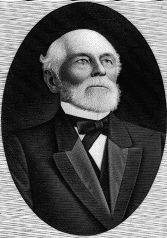William Marsh Rice
William Marsh Rice (March 14, 1816 – September 23, 1900) was an American businessman and philanthropist. He is best known for his pivotal role in the founding of Rice University in Houston, Texas. Rice's life was marked by his significant contributions to the development of the American South, particularly in the state of Texas, and his enduring legacy is reflected in the educational institution that bears his name.
Early Life[edit | edit source]
William Marsh Rice was born in Massachusetts to David Rice and Patty Hall Rice. His early education was limited, but he showed an aptitude for business from a young age. In the 1830s, Rice moved to Texas, then a part of Mexico, seeking new opportunities. He settled in Houston and began his career as a merchant.
Business Career[edit | edit source]
In Houston, Rice quickly established himself as a successful businessman. He engaged in various enterprises, including trade, real estate, and banking. His business acumen allowed him to amass a considerable fortune. Rice's investments in Galveston, Texas, particularly in the cotton trade, significantly contributed to his wealth.
Philanthropy and Legacy[edit | edit source]
William Marsh Rice's most enduring legacy is the establishment of Rice University. In 1891, Rice chartered the William Marsh Rice Institute for the Advancement of Literature, Science, and Art as a free institution for the advancement of education. Following his mysterious murder in 1900, a legal battle ensued over his estate. It was eventually determined that the bulk of his fortune would go towards the founding of the institute, which opened in 1912.
Rice University has since become one of the leading research universities in the United States, known for its strong programs in science, engineering, and liberal arts. The university's campus, characterized by its Byzantine architectural style, is a landmark in Houston.
Death and Controversy[edit | edit source]
Rice's death on September 23, 1900, was shrouded in controversy. Initially thought to be due to natural causes, it was later revealed that he had been poisoned by his valet, Charles Jones, in a conspiracy with Rice's lawyer, Albert T. Patrick, to forge Rice's will and steal his estate. The plot was uncovered, leading to Patrick's conviction, though he was later pardoned. The scandal highlighted the vulnerabilities of the wealthy and the lengths to which individuals would go to secure their fortunes.
Conclusion[edit | edit source]
William Marsh Rice's life story is a testament to the impact one individual can have on the development of a region and the advancement of education. His vision for a comprehensive educational institution in Houston has left a lasting legacy that continues to influence the city and the broader academic community.
Search WikiMD
Ad.Tired of being Overweight? Try W8MD's physician weight loss program.
Semaglutide (Ozempic / Wegovy and Tirzepatide (Mounjaro / Zepbound) available.
Advertise on WikiMD
|
WikiMD's Wellness Encyclopedia |
| Let Food Be Thy Medicine Medicine Thy Food - Hippocrates |
Translate this page: - East Asian
中文,
日本,
한국어,
South Asian
हिन्दी,
தமிழ்,
తెలుగు,
Urdu,
ಕನ್ನಡ,
Southeast Asian
Indonesian,
Vietnamese,
Thai,
မြန်မာဘာသာ,
বাংলা
European
español,
Deutsch,
français,
Greek,
português do Brasil,
polski,
română,
русский,
Nederlands,
norsk,
svenska,
suomi,
Italian
Middle Eastern & African
عربى,
Turkish,
Persian,
Hebrew,
Afrikaans,
isiZulu,
Kiswahili,
Other
Bulgarian,
Hungarian,
Czech,
Swedish,
മലയാളം,
मराठी,
ਪੰਜਾਬੀ,
ગુજરાતી,
Portuguese,
Ukrainian
Medical Disclaimer: WikiMD is not a substitute for professional medical advice. The information on WikiMD is provided as an information resource only, may be incorrect, outdated or misleading, and is not to be used or relied on for any diagnostic or treatment purposes. Please consult your health care provider before making any healthcare decisions or for guidance about a specific medical condition. WikiMD expressly disclaims responsibility, and shall have no liability, for any damages, loss, injury, or liability whatsoever suffered as a result of your reliance on the information contained in this site. By visiting this site you agree to the foregoing terms and conditions, which may from time to time be changed or supplemented by WikiMD. If you do not agree to the foregoing terms and conditions, you should not enter or use this site. See full disclaimer.
Credits:Most images are courtesy of Wikimedia commons, and templates, categories Wikipedia, licensed under CC BY SA or similar.
Contributors: Prab R. Tumpati, MD

